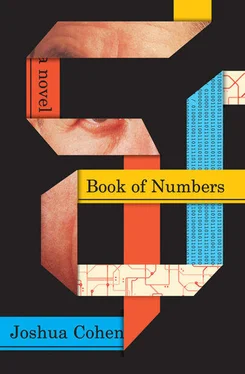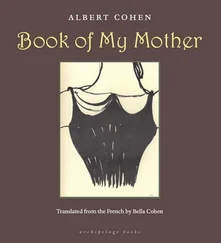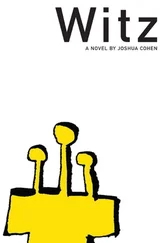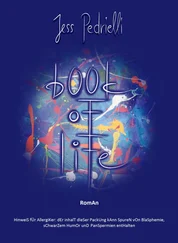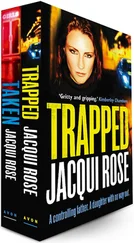So then I went ahead and printed all of it, Cal, because that’s just what we do — I’m not going to pretend it was ever a choice, but neither am I going to pretend it wasn’t difficult. 9/11 pubdate, Miri pulverized, Aar gnashing out in the wilderness beyond all assuagement and phone reception, you and your fame, Cal — and then in the midst of all that, Finn came through, or Kimi! did (and what the hell ever became of Kimi!?), either one of them or just a distributor’s order fulfillment robot sent Moms a finished copy. I hadn’t let her read any earlier version (I’m not about to lecture you, Cal, on how agonizing it is letting others read your drafts, doubly so if they’re the subject and are bound to be troubled). Moms wasn’t just troubled, she was furious, but she didn’t call me, she called Israel. She’d gotten online at the house around then, and she and her cousins were emailing too. She was never “raped” by the Soviet starshina, she said, because after the first time, he paid her in food, and after the last time, he paid her in a map and outlined a tentative route to where her brothers lived, where they had lived and operated branches of their family’s lumber firm, in Žilina (or Sillein in German) and Brno (or Brünn). Anyway, she said, the soldier wasn’t a starshina, but a podpolkovnik. Moms and Tante Idit and Onkel Menashe feuded back and forth over whether “rape” meant the same thing in Yiddish, Polish, and Russian. Whether the Red Army rank of the soldier corresponded to the Israeli Army rank of seren or segen — lieutenant colonel? full colonel? And it wasn’t like I was trying to stay out of it, Cal — Moms kept me out of it, and the only way I knew anything was that the Israelis would fwd: me the emails. That’s how I knew that Moms otherwise enjoyed the book, or just wouldn’t admit to her cousins that she hadn’t — all her emails began “Dear Yetta and Menashele,” and ended with her signing herself, not Yocha, but “Love, Gloria.”
I also got a letter then — through the mail, through the fanmail, Cal — forwarded from Random House, October or November, 2001. I responded, and it led to a lunch. Which led to another. Retirees transited in from the Five Towns on the Island and from Main Line Philly to have lunch with me and then go gawk at the pit downtown.
They were readers, they were my only readers — if I didn’t snare the women I at least had a corner table with the only consolation demographic, geriatric Jews — but they didn’t want to talk about my book. They wanted to talk about my father.
You know, I’m sure you do, Cal, how you expend all this effort writing something and thinking through the detail of every decision (do I name the restaurants we met at? or just describe them? do I mention what was ordered? who took care of the bill?), but then you finish, or you delude yourself into finishing, and realize — too late, with the book already a classic of the bargain bin — that you’d missed something, a scene or even just a line that would’ve brought everything together, that would’ve resolved all the fogs — a gesture just as crucial to your life, but also as easily forgotten in daily life, as a person you’d loved who’s now dead.
My father. I’d hardly mentioned him in all my pages. Because Moms’s account of their meeting had demoted him into a handsome uniform that acted swiftly. My father was like a new character introduced at the end of a book, as the end of a book — a Daddy ex machina, maybe. And it’s been on my mind ever since, or — I’m trying for honesty — what’d then been a guilty notion I was in no psychological state to pursue is recurring only now, the notion that if there were to be any reissue or updated edition I would write an afterword to it, an afterword about him. And hey, a girl can dream, can’t she? a girl can flashback????
David Cohen, Private First Class, US First Army, had liberated Buchenwald, where the Yiddish competency he demonstrated so impressed the OSS officers he debriefed that they took him along to interrogations at Dachau, Mauthausen, and after V-E Day, here, to Vienna, where he was attached to command — according to the oldsters I was meeting with, my father’s former colleagues.
To be totally accurate, Cal, the guy who’d read my book and initially contacted me was this decorous epitomist Connecticut WASP, from rep tie to bucks with the blueblood suit between, and it was only after he’d vetted me over lunch at the Union Club that he sent the other guys my way, his octogenarian Jewish subordinates who claimed they recalled me coming up to their knees, their knees since replaced, at my father’s funeral — there was a Prussian yecca type with spoon up his ass posture who as a policy refused to eat and talk or even be talked to at the same time, and then two widowers who resembled Dad biographically, being the sons of Jewish immigrants from Warsaw who grew up south of Delancey speaking Yiddish. That language had bound them together, and brought them to the captain — the WASP had retired from the OSS as a captain — for whom they interpreted interrogations of, and translated testimonies by, survivors of concentration and labor camps, which were cited extensively in the subsequent war crimes tribunals.
Cal, they were filling in a man I had never known. A man my mother, reciting the shameless sanitized version of this story, the Story, had never known either — or had forgotten with her arrival in Jersey, her renaming as Gloria, her infirmities (avitaminosis) (stomatitis), and lack of baby, her spats with my father’s parents, attempts to master cooking and English by reading Ladies’ Home Journal recipes and cooking through the irreconcilable fascinations of The Honeymooners and Bonanza .
Vienna, 1945, the latter winter of a year that’d felt all winter — my father left US Army HQ, the former Hotel Bristol, located on the Ring (after the war it became a hotel again, and now its rooms cost north of €308/night). In one direction was the recently unnamed Adolf-Hitler-Platz, in the other the recently renamed Josef-Stalin-Platz — Vienna, like Berlin, was divided into zones. But my father headed for neither. Nor did he stop at his lodgings off Kärntner Straße. Instead, he went on toward the river — Why? The downtown Jews said, Why? Because word had come in that the Danube had just frozen over, and my father wanted to check. The downtown Jews told me this as if it was unimpeachably logical, and it was, because that’s who Dad was: the type of man who if you told him the river’s frozen was going to want to check. There by the riverbank he met a woman — a woman who’d just walked in gaiters taken off a Wehrmacht soldier, which meant off a Wehrmacht corpse, from Poland to Žilina to Brno to Vienna (I’m in no position to record the numbers just now, Cal, but consult the book or imagine around 600 kilometers or 400 miles), and was starving and feverish and out in the incipient snow begging — Moms would never admit to begging — and who called out to him in Yiddish, Zeit moychel, because Dad had a face like one of her brothers, who’d died in Theresienstadt, or Auschwitz. Dad gave her chewinggum, took her for a sawdusty schnitzel at a basement café. And then maybe to his room, the downtown Jews said. Then again, maybe not. Because she was icicle skinny like a Muselmann, they said. That’s what they called the people in the camps not gas exterminated but exterminated by hunger, Muselmänner. My mother was named Yocha then — did I mention that? Is this what senility is like? It was illegal to marry her. The downtown Jews said the Army might’ve courtmartialed my father under the GI ban on fraternization, which tended to treat brides unable to provide evidence of their identities as enemy nationals until proven innocent. But the captain said they wouldn’t have dared. The yecca, that scooped asshole Prussian, who just before I closed our tab at French Roast ordered fries for takeout, said that he was the one who’d forged her papers — though, he noted, it might not have been forgery because it was done on the captain’s orders — and not a Nansen Displaced Persons document either but a straight Shipley US passport that characterized the bearer as a secretarial assistant in the office of the special advisor on Austrian affairs, and falsified her age. My father was 21 and had an honorable discharge pending, Moms was — she guessed she was—16. They married, 4/16/1946, in the synagogue on Seitenstettengasse, the sole shul to survive in Vienna, in a ceremony officiated by Chaplain Rabbi Daniel S. Daniels of Worcester, MA, who died in a car wreck on I-95 in the late 1980s, on Shabbos. Back in civilian life, Dad studied actuarial science at Newark Technical School. In the gaps between assignments and a Bamberger’s shift he set about tracking down Moms’s relatives. Yetta had become the Hebraicized Idit, after Birkenau, but Menashe, who’d fled to Argentina, was still just Menashe — did I mention that? Am I confusing you, Cal? Moms and Dad visited them regularly in Israel — because, Moms liked to say, the Tel Avivniks were always too poor to visit us — and after I was born they brought me with them, though they went less and less, until we moved from Newark out to Shoregirt and they got up the confidence to fly without me maybe twice, because Shoregirt had a yard and picket fence and Jewish neighbors in the insurance business for me to stay by, the Tannenbaums. The last time my parents made the trip I wasn’t yet 12, and I’d worked out this compromise by which I was able to spend the afterschool day at my own house all alone, but had to report to the Tannenbaums’ house at dinnertime each night, for boiled chicken “cacciatore,” kugel “moussaka,” a dessert review of my bar mitzvah portion, and bed. Then my parents returned, and the back muscle that Dad had strained — from having lifted their suitcases loaded with a copy of Walt Whitman’s Bletlekh groz for Menashe and bras for Idit and cameras and camcorders for all their children and grandchildren — was diagnosed as a lung sarcoma, and all the traveling they did after that was to Sloan Kettering. My father refused to die only because it meant leaving my mother, but what was truly remarkable was that he’d lived that way too, which was why he’d never attended the reunions, and only met his army friends on worktrips to NY, and at his funeral — he had to be there anyway.
Читать дальше
